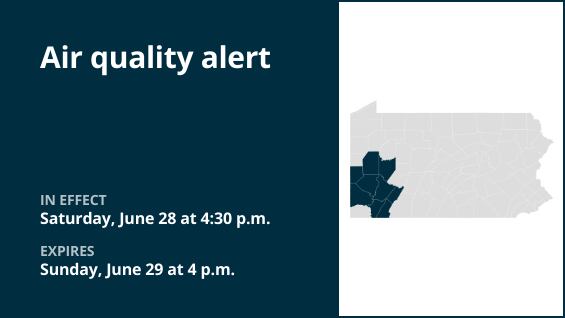At 4:30 p.m. on Saturday, the National Weather Service announced that Butler, Beaver, Allegheny, Armstrong, Washington, Westmoreland, and Fayette counties, as well as Westmoreland Ridges and Fayette Ridges, were under an air quality alert that would last until 4 p.m. on Sunday.
“The greater Pittsburgh area, which includes Allegheny, Butler, Beaver, Armstrong, Washington, Westmoreland, and Fayette counties, is under a code ORANGE air quality alert for Sunday, according to the Pennsylvania Department of Environmental Protection. When there is a code ORANGE air quality alert, it indicates that the region’s air pollution levels could become dangerous for vulnerable populations. Children, the elderly, and those with heart disease, asthma, or other lung conditions are among the sensitive categories. Avoiding intense activities or outdoor exercise can help reduce the impacts of air pollution, according to the weather service.
Air quality alerts: Recommendations from the weather service
Understanding the consequences of an air quality alert is essential when it appears on the radar. These weather service-issued alerts include simple but crucial instructions to keep you safe:
When possible, take refuge indoors:
Stay inside if you can, especially if you have health problems, respiratory disorders, or are a youngster or an elderly person.
Reduce outdoor activities:
If you can’t avoid going outside, limit your time there to necessary activities. Exposure must be minimized.
Reduce the sources of pollution:
Use caution when engaging in activities that increase pollution, such as operating gas-powered lawnmowers, driving cars, or using other motorized vehicles. Use them sparingly when there is an air quality alert.
Put an end to open burning:
When there is an air quality alert, don’t burn any materials or debris. As a result, the quality of the air gets worse.
Keep yourself updated:
Listen to NOAA Weather Radio or your favorite weather news source to stay informed. Keeping yourself informed during air quality alerts enables you to make wise choices about outdoor activities.
The importance of respiratory health
Be very careful if you have underlying medical diseases or respiratory issues. These circumstances may make you more susceptible to the negative consequences of low air quality.
You can lessen your exposure to potentially dangerous pollutants and improve your safety during air quality alerts by following the weather service’s recommendations. Prioritize your health, be vigilant, and take precautions.
United Robots offers a service called Advance Local Weather Alerts that gathers the most recent information from the National Weather Service using machine learning.






